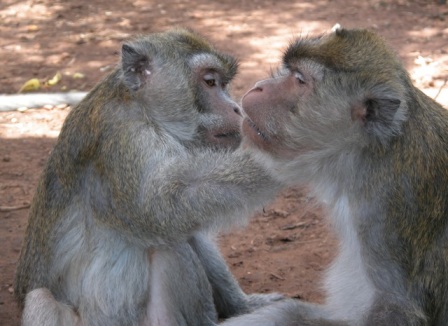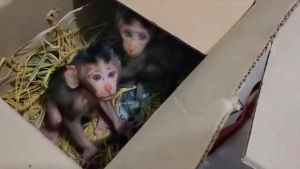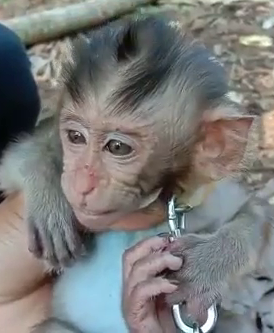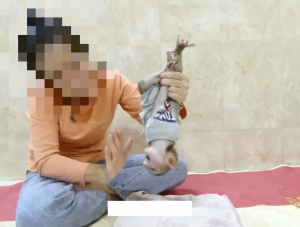Action for Primates

|
Action for Primates |

|
|

Online content that involves animal abuse and cruelty, especially towards monkeys, is available on social media platforms, including Facebook, TikTok and YouTube. Disturbing content of deliberate and gratuitous suffering involving baby monkeys is posted on channels and by online groups for 'entertainment', with some channels monetised. Videos posted show the 'disciplining' and tormenting of captive infant monkeys, the deliberate infliction of pain and fear, causing physical harm as well as emotional distress. Examples include placing the monkeys in fearful and distressing situations, such as setting off firecrackers close by, and then filming their reactions. Others include slapping and hitting the monkeys and feeding monkeys noxious substances. Another common theme is 'fake rescues', where baby monkeys are deliberately placed in potentially harmful situations with the film maker then playing the role of 'rescuer'.
No responsible video-sharing platform should tolerate animal cruelty in the guise of 'entertainment'. Despite their public pronouncements and policies, social media companies are failing to effectively oversee their platforms, in some cases allowing shocking footage to remain online despite it being brought to their attention. By permitting such content on their platforms, social media companies are complicit in promoting animal cruelty and abuse, including making it profitable for abusers. Viewers of this abusive content are encouraged to inflict deliberate acts of cruelty on other animals because of the failure of social media companies to monitor and enforce any existing policies.
Action for Primates believes that social media platforms must implement and enforce animal cruelty policies and immediately take down all abusive content. To be more effective, the people responsible for such content must be permanently banned from using such platforms. Further, the people carrying out the acts of cruelty and abuse need to be reported to government officials in their country so that applicable animal cruelty laws can be enforced.
Investigation into 'monkey haters' online groups

The torture and abuse have been primarily filmed in South-East Asia, in particular Indonesia, and usually involves long-tailed macaques, a non-human primate species indigenous to the region. In 2021, an investigation by Action for Primates and Lady Freethinker revealed the disturbing escalation in the violence and torture inflicted upon monkeys, with the formation of private groups on platforms such as Telegram, where members pay to have baby monkeys tortured and killed on camera (more information). As a result of this investigation, one individual – Asep Yadi Nurul Hikmah – responsible for unimaginable cruelty and abuse inflicted upon baby monkeys in Indonesia, was convicted and imprisoned in December 2022 (more information). Incredibly, many of these videos were made available, not just in private groups, but also through platforms such as Facebook, YouTube and others.
Conviction of YouTuber in Indonesia
In 2021, following complaints submitted to the Governor of Jakarta by Action for Primates and Jakarta Animal Aid Network (JAAN), Rian Mardiansyah was convicted and sentenced to a fine and imprisonment for behaviour relating to exploitation and violence against monkeys. Examples of this cruelty included spraying monkeys with jets of water, rubbing obnoxious substances such as glue or chilli onto their food and lighting firecrackers and sparklers to scare them. The videos he created were posted on his YouTube channel Abang Satwa (previously called 'Monkey Raging'), complete with soundtracks and commentary, and he asked people to send donations (more information). Three of the macaques – Boris, Mona and Boim – were confiscated. They are currently at the JAAN rescue centre, enjoying a life free from the torment and cruelty to which they were being subjected daily, while being rehabilitated to return to their natural homes.

Cruelty to baby monkeys kept as 'pets' for online 'entertainment'
The keeping of wild infant monkeys as 'pets' to use for online 'entertainment' on social media platforms, such as Facebook and YouTube, has become a trend in countries such as Cambodia where Action for Primates and Lady Freethinker carried out an investigation. Although the cruelty may not always be obvious and some of the situations may seem innocuous, it is important to realise that these vulnerable infants are being deprived of their mothers, held captive under unnatural conditions, with their behaviour controlled and manipulated to 'perform' several times a day, while being filmed for human 'entertainment'. Such videos depicting cruel treatment of individuals, are irresponsible and dangerous. Despite any show of affection, whether sincere or fabricated, the people involved are responsible for causing substantial harm and inflicting suffering and distress upon these baby monkeys. These videos also normalise the incarceration of wild baby monkeys as well as perpetuating the legal and illegal trade in wild monkeys as 'pets'. We have documented the maltreatment of infant macaques; click here to view our video. See elsewhere for more information.
Social Media Animal Cruelty Coalition
Action for Primates is a member of the Social Media Animal Cruelty Coalition (SMACC), established by Asia for Animals Coalition (AfA). SMACC is playing a key role in coordinating efforts among animal welfare organisations across the world, raising awareness and educating the public, preparing informative documents and continually seeking dialogue with social media platforms.
UK Online Safety Bill
The UK Online Safety Bill, which is progressing through Parliament, establishes a new regulatory framework to increase accountability of online technology companies and protect users, especially children and vulnerable adults, from harmful online content. Self-regulation by social media platforms is not working and there is a strong need for this important legislation, which could impact social media regulation worldwide. The Bill, however, does not include reference to the widespread shocking and distressing animal cruelty content that is available on social media platforms. Action for Primates has submitted written evidence to the parliamentary committees and contacted Members of Parliament. Together with other animal protection groups, we are calling for animal cruelty content to be brought explicitly within the scope of the Online Safety Bill and thereby within the scope of duties imposed on online technology platforms (more information).
How you can help stop monkeys and others being exploited and abused on social media
A study published in 2021, has found that YouTube is likely responsible for creating the normalisation of people interacting with captive wildlife, promoting a demand for 'exotic pets' and contributing to an increase in the trade in wildlife and a loss of biodiversity (Moloney et al 2021). The authors concluded that, As YouTube® itself plays a crucial role in enabling and encouraging public access to this content, they must also accept social responsibility for creating a culture wherein human engagement with threatened exotic wildlife has become acceptable.
![]()
![]()
![]()
![]()
![]()
Contact us via E-mail
Copyright © 2020-2026 Action for Primates. All rights reserved.